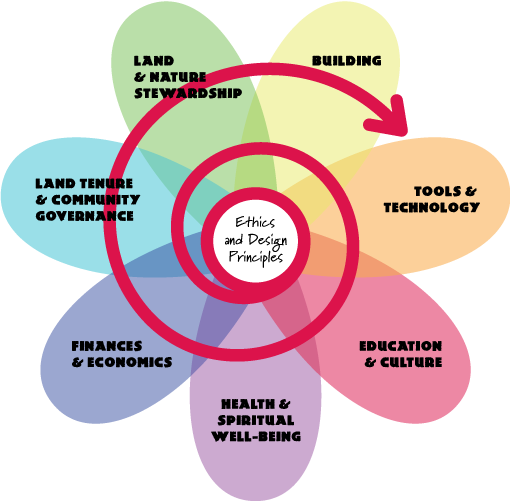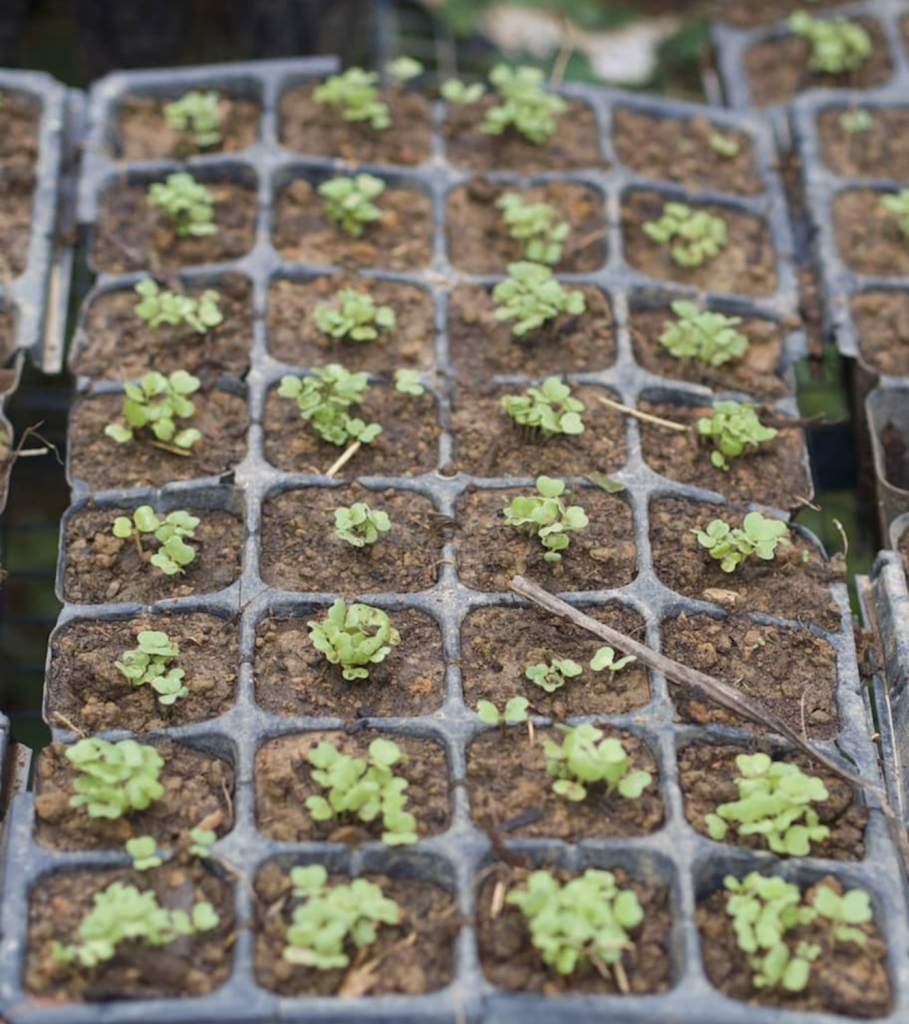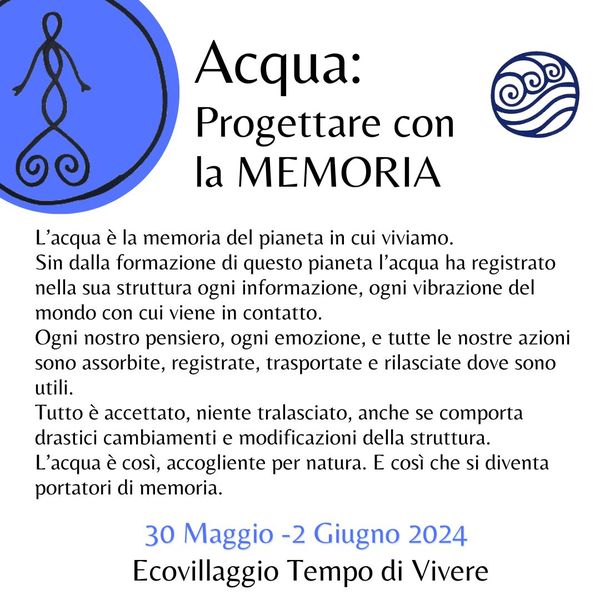Permaculture
““Permanent agriculture” & “Permanent culture”
“a culture cannot survive long without a sustainable agricultural base
and land use ethics”“
Bill Mollison
What is Permaculture?
“Permaculture is a genuine and wholesome revolution to become new human beings in harmony and synergy with nature”
Lele

Village intentions
It is necessary to carry forward a culture of sharing, stable and promote a society made up of "Duties and Responsibilities before rights". We propose, therefore, to create a place where individuals can serenely participate and be part of those who, like us, seek to build a better future.
Goal
A change in a sustainable direction Against compulsive consumerism, we try to improve together with you.
The work
It has spiritual value and is understood as a gift of self to others. Through it, everyone participates in the spiritual and material activities of the population. The citizen offers part of his time in works of common interest and enhances the field of volunteering. Each task is as precious and dignified as any other
Motivations
Nurturing the sense of the divine in you (that inner voice that says, “There’s something more to life”)
Exploring spiritual values and community life, to develop a magical vision of existence
Build relationships with like-minded people
Feeling within oneself the feeling of “being called” towards something more
Desire to participate, contribute and share their talents and energies towards something bigger
Open to transformation and growth
They believe in the possibility of building a better world together with others
They take responsibility and create opportunities for others
I’m not afraid to expand personal boundaries and my comfort zone

Principles and Practices of Permaculture
Food
Food as nourishment and preventive medicine: Cultivating healthy and nutritious foods while respecting natural cycles.
Sustainable Infrastructures
Building with local, non-invasive materials based on actual needs.
Efficient Energy
Designing plans to save energy and optimize resources.
Sustainable Cycles
Every activity must be “meaningful,” aligned with the principles of a permanent culture.
Mindfulness
When starting to practice permaculture, it is essential to develop a deep awareness of how our actions impact the planet and the community.
Visitors, travelers, and volunteers play a crucial role in supporting the project. However, they sometimes bring habits rooted in consumerism that may conflict with the core principles of permaculture.
A key aspect of ecological awareness is measuring and reducing one’s environmental impact. For instance, understanding your Carbon Footprint can help assess how much each of us contributes to the consumption of energy and natural resources.
Unfortunately, certain behaviors and attitudes can slow progress toward living in harmony with nature. Among these, we often observe:
- Nomophobia: dependency on mobile phones and constant connectivity.
- Compulsive buying syndrome: a behavior that fuels consumerism.
- Discontent with the present: a negative perception of reality that hinders gratitude and respect for our surroundings.
Additionally, consuming food produced by large corporations often contributes to health and environmental issues. These foods, sometimes referred to as “poison food,” may contain harmful ingredients and generate significant amounts of non-recyclable waste. Managing such waste is particularly challenging in natural settings, where modern disposal systems are unavailable, leading to growing environmental harm.
These behaviors and habits stand in contrast to the principles of permaculture, which promote sustainability and respect for ecosystems. Unfortunately, it is still common to see guests or volunteers approaching ecology with inconsistency—for instance, consuming products from corporations that harm the environment.
At this point, we must ask ourselves a fundamental question:
Do you respect the planet, others, and the shared project? Or are you someone who prioritizes individual freedom over respect for the community and the environment?
Permaculture requires commitment, consistency, and mutual respect to build a better future together. It is up to each of us to reflect on our role and our actions.

Quotes, Thoughts, and Insights on Permaculture
Permanent Culture. Trying to build a society in which the cycle of things useful for life returns in harmony to nature (resilience) with waste building wealth, ecology in line with the first law of the universe “nothing is created, nothing is destroyed but everything is transformed” in the name of this transformation, sensible and ethical, permaculture proposes non-invasive cycles on the activities of life, it provides that food is nourishment and preventive medicine. The infrastructures must be built with local and non-invasive materials, both from the real needs of the spaces and projects and from the materials used. The production of energy, plans are organized to make energy parsimony. When a cycle, a job, a social activity is judged to be “sensible”, then we are thinking in terms of permanent culture.
Permaculture it can be defined as a synthesis of ecology, geography, anthropology, sociology and design.
Lele
“Permaculture is based on the observation of natural systems, the wisdom contained in traditional agriculture of the past, and modern scientific knowledge. Based on ecological models, permaculture creates a cultivated ecology, which is designed to produce food for humans and animals of the kind found in nature.”
From Aranya Courses
“Permaculture simply asks people to put into life what they ask from life itself. Is this asking too much to save the world? Use its principles in everyday life, teach your children, inform your local, national and international governments of the wisdom it contains.”
From the introduction to the book “The permaculture way” by David Bellamy
“Permaculture is the Landscape consciously designed by imitating the patterns and relationships found in nature, and producing an abundance of food, fiber and energy for local needs.” From “Permaculture, principles and paths beyond sustainability”
David Holmgren
“Permaculture seeks to maximize productivity while minimizing the importation of needs such as labor, money, time, energy.”
From Graham Bell’s Courses
“Permaculture can be described as: careful thinking followed by minimal action instead of hasty action followed by long-term repentance.”
From “The earth care manual” by Patrick Whitefield
“Permaculture (Permanent Culture) is the conscious design and maintenance of productive agricultural ecosystems that possess the diversity, stability and resilience of natural ecosystems. Permaculture is the harmonious integration of landscape and people to provide their food, energy, protection from the elements and other material and non-material needs, in a sustainable way.”
“Permaculture design is a system for assembling conceptual, material and strategic components into a model that works for the benefit of life in all its forms.”
From “Permaculture, A Designers’ Manual” by Bill Mollison
Aphorisms and thoughts on freedom and consumerism
“Freedom is sharing” G Gaber
“We should all together in the world fast from consumerism” T. Terzani.
The “Power” of the consumer society is invasive and pervasive but invisible and according to Pasolini it produces a much deeper conditioning than fascism managed to do, because it has more effective means of communication such as television at its disposal and therefore is able to create homologation, conformism, uniformity and a much more creeping form of repression that he defines as “total fascism”. P.P. Pasolini
